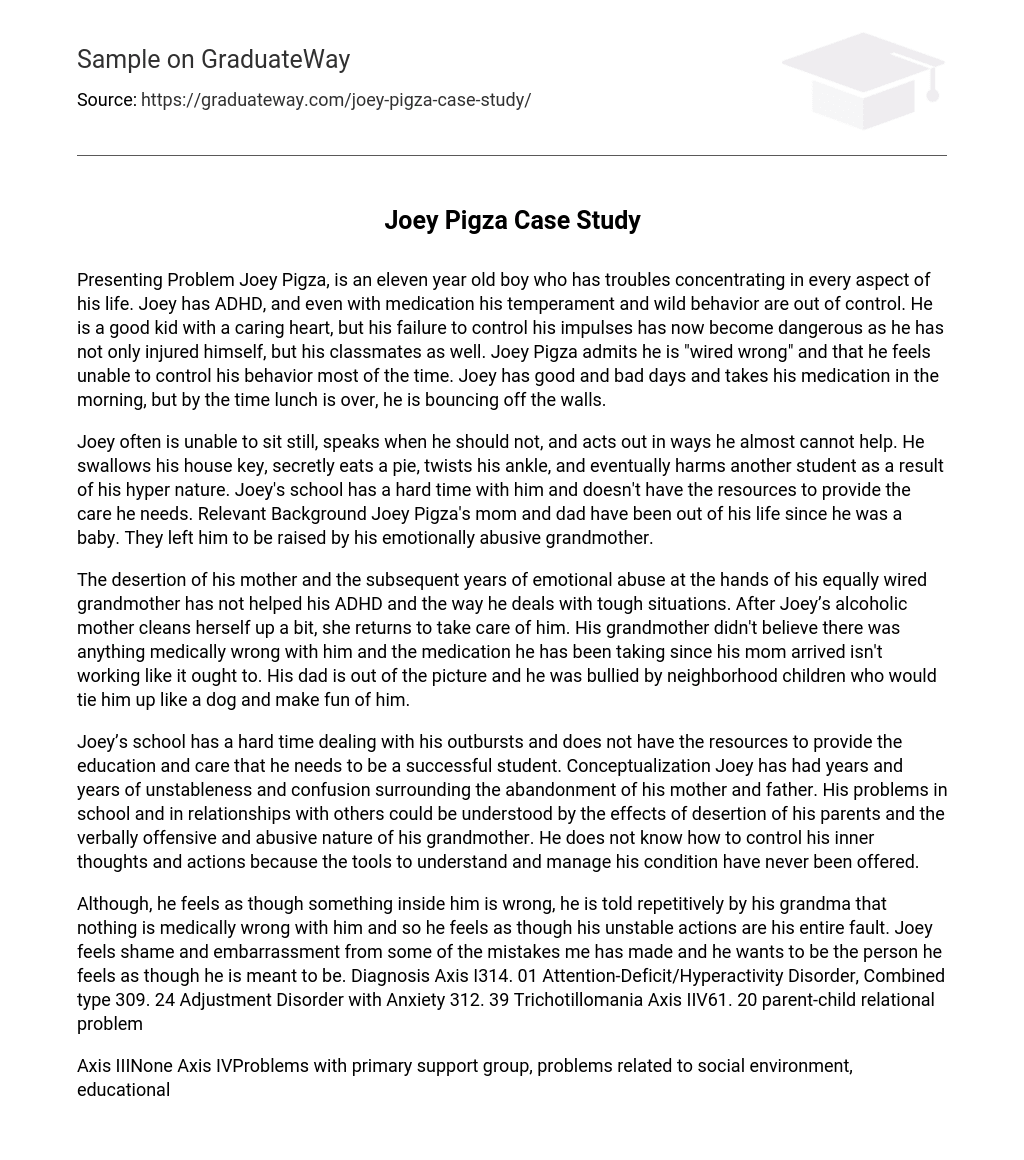Presenting Problem Joey Pigza, is an eleven year old boy who has troubles concentrating in every aspect of his life. Joey has ADHD, and even with medication his temperament and wild behavior are out of control. He is a good kid with a caring heart, but his failure to control his impulses has now become dangerous as he has not only injured himself, but his classmates as well. Joey Pigza admits he is “wired wrong” and that he feels unable to control his behavior most of the time. Joey has good and bad days and takes his medication in the morning, but by the time lunch is over, he is bouncing off the walls.
Joey often is unable to sit still, speaks when he should not, and acts out in ways he almost cannot help. He swallows his house key, secretly eats a pie, twists his ankle, and eventually harms another student as a result of his hyper nature. Joey’s school has a hard time with him and doesn’t have the resources to provide the care he needs. Relevant Background Joey Pigza’s mom and dad have been out of his life since he was a baby. They left him to be raised by his emotionally abusive grandmother.
The desertion of his mother and the subsequent years of emotional abuse at the hands of his equally wired grandmother has not helped his ADHD and the way he deals with tough situations. After Joey’s alcoholic mother cleans herself up a bit, she returns to take care of him. His grandmother didn’t believe there was anything medically wrong with him and the medication he has been taking since his mom arrived isn’t working like it ought to. His dad is out of the picture and he was bullied by neighborhood children who would tie him up like a dog and make fun of him.
Joey’s school has a hard time dealing with his outbursts and does not have the resources to provide the education and care that he needs to be a successful student. Conceptualization Joey has had years and years of unstableness and confusion surrounding the abandonment of his mother and father. His problems in school and in relationships with others could be understood by the effects of desertion of his parents and the verbally offensive and abusive nature of his grandmother. He does not know how to control his inner thoughts and actions because the tools to understand and manage his condition have never been offered.
Although, he feels as though something inside him is wrong, he is told repetitively by his grandma that nothing is medically wrong with him and so he feels as though his unstable actions are his entire fault. Joey feels shame and embarrassment from some of the mistakes me has made and he wants to be the person he feels as though he is meant to be. Diagnosis Axis I314. 01 Attention-Deficit/Hyperactivity Disorder, Combined type 309. 24 Adjustment Disorder with Anxiety 312. 39 Trichotillomania Axis IIV61. 20 parent-child relational problem
Axis IIINone Axis IVProblems with primary support group, problems related to social environment, educational problems Axis V GAF scale 54 Treatment Recommendations: ADHD: Treatments include medication, various types of psychotherapy, education or training, or a combination of treatments. Different types of psychotherapy are used for ADHD. Behavioral therapy aims to help Joey change his behavior. It might involve practical assistance, such as help organizing tasks or completing schoolwork, or working through emotionally difficult events.
Behavioral therapy would also teach Joey how to monitor his own behavior. When used along with traditional ADHD treatments such as stimulant medicines and counseling, regular fitness can have a positive impact on a child’s ADHD symptoms. An evaluation of Joey’s learning style and strengths may be advisable to better match classroom and other supports with his learning style. Adjustment Disorder: While much of treatment usually is individual psychotherapy, family members can benefit from a family session after the start of individual psychotherapy.
During the family session, the therapist should reassure Joey’s family that the Adjustment Disorder usually is short-lived and should respond to their understanding and support. This family therapy might also repair some of the parent-child issues Joey is facing. Trichotillomania: An approach that might help Joey’s Trichotillomania might be a type of psychotherapy called cognitive behavior therapy. This Therapy could allow Joey to use techniques to match his symptoms. Another type of therapy that might help him would be Habit Reversal Training to help teach him another behavior to replace the hair pulling.





